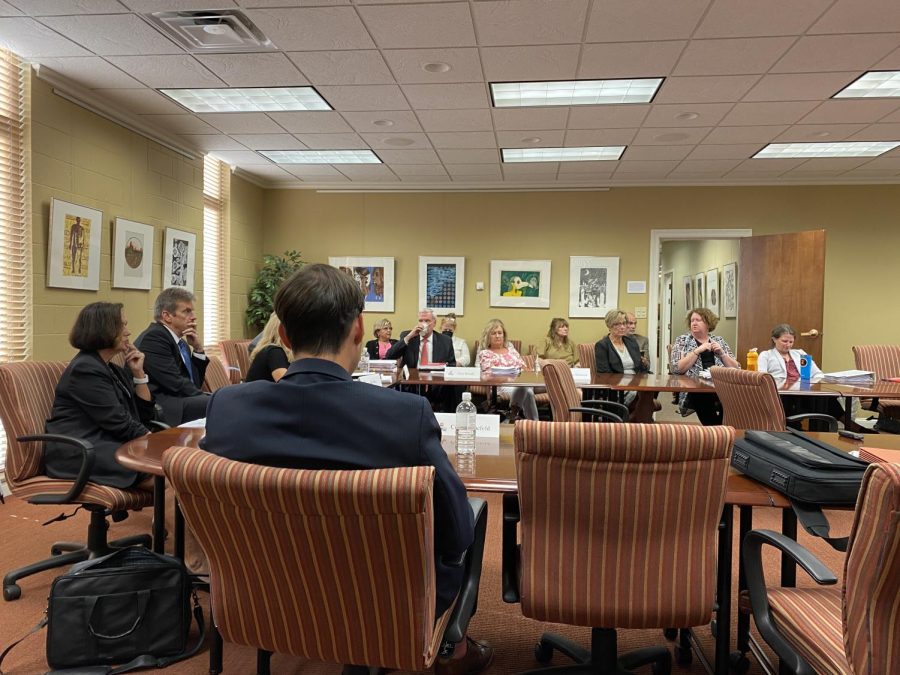UPDATED: Regents vote ‘no’ on dismissal of tenured professor
Regents, faculty and university figures wait for the board’s final decision on the dismissal of Jeanine Huss in the Wetherby Administration Building on Friday, July 29.
July 29, 2022
Editor’s note: this story has been updated in full following Friday’s regents meeting.
After an unprecedented nine-hour dismissal for cause hearing, the WKU Board of Regents voted 8-0 not to dismiss Jeanine Huss, tenured faculty and full-time professor in the school of teacher education.
WKU president Timothy Caboni had recommended the board affirm Huss’ dismissal for cause, that being incompetency, in the meeting’s only action item. The board took two hours to deliberate in a closed session before delivering the unanimous vote.
Full live coverage from the meeting can be found here.
Chair Phillip Bale and vice chair Currie Milliken were not present. Regent George Nichols III was present via Zoom, but left the hearing before the vote. It was the first meeting for newly appointed regents Gary Broady and Melissa Dennison and new student regent Cole Bornefeld.
Huss arrived at WKU in 2005, earned tenure in 2011 and became a full professor in 2018. She was represented in the hearing by Marc Mezibov, an attorney out of Cincinnati law firm Mezibov Butler.
“We can hash this out in court because that’s where it’s going to go,” Mezibov said in his closing statement before the executive session. “No, I’m not threatening. I’m telling you that’s the inevitable result if Dr. Huss is dismissed.”
Jace Lux, university spokesperson, provided the following statement on behalf of the university after the vote:
“Today’s hearing followed the process outlined in the WKU Faculty Handbook. After hearing evidence from both sides, the Board voted not to dismiss the professor for cause. This outcome demonstrates the university’s commitment to following established procedures and participating in shared governance. As is WKU’s usual practice, the University will not speak further on the details of this employment action at this time.”
The grueling dismissal hearing laid out the lengthy timeline of events that ultimately led to Friday’s meeting.
In October of 2020, Susan Keesey, interim director of the school of teacher education first received student concerns about Huss.
According to Keesey, a student sent an email outlining issues they had with one of Huss’ classes, which at that time was being taught virtually.
“The student was concerned that grades had not been completed, they were getting ready to teach a lesson plan and their lesson plan still hadn’t received feedback,” Keesey said. “Just a great concern about not having the tools and things they needed to be able to be successful.”
Keesey said some other complaints from that semester included being given busy work, a lack of feedback and communication issues. These issues continued into the spring of 2021, with Keesey becoming choked up when reading some of Huss’ evaluations to the board.
“In my 15 years of schooling she is by far the worst teacher I have had, I dread this course since she wastes our time with meaningless assignments… instead of providing feedback she just deleted our work in entire paragraphs, it was a rough semester… If I am to become a teacher it will be at a different college away from her,” an emotional Keesey read.
Keesey said she felt something had to be done, and that she wanted to remove Huss from her undergraduate courses because she “couldn’t in good conscience make these students have her again in the fall.” She said Corinne Murphy, dean of the college of education and behavioral sciences, was Keesey’s “voice of reason” and explained why Huss couldn’t just be pulled out of teaching those courses.
Instead, Keesey had Huss review her evaluations and the pair had a “painful” conversation. It was agreed that Huss would be put on a performance improvement plan and over the summer was to think of ways to improve her teaching style to address student complaints.
Additionally, Huss’ fall 2021 course load was reduced to a pair of three credit hour graduate courses. Murphy said this change was made to address a “deficiency in teaching.”
Per Keesey, Huss’ evaluations improved in fall of 2021 and the comments left by students were “better than they were in the spring.”
Feb. 15, 2022 was the subject of a large bulk of the meeting’s discussion. A student sent a complaint email to Murphy regarding a series of events in Huss’ ELED 355-001 Student Diversity class.
The student wrote that Huss had made “several comments that I do not believe are professional, appropriate or represent this program or profession well.” The class was given an assignment where they were to “dress as a diverse person” and present about their life, which the student felt was cultural appropriation.
Murphy stated that, when asked, Huss could not make a connection between the assignment in question and the courses’ learning outcomes “in a way that the students appreciated.”
The complaint continued, with the student alleging Huss had said something to the effect that African-American students learn better orally because “their ancestors sang slave songs.”
The email can be read in its entirety here.
Huss was placed on paid administrative leave the next day and was removed from the classroom. Per Keesey, an email was sent out to students looking for feedback on the ELED 355 course.
Mezibov asked if Huss received any positive feedback. Students at WKU’s Owensboro site, where Huss had been teaching, provided positive feedback.
Murphy said Huss had an “opportunity to respond” to these points of feedback. Because she was on a performance improvement program at the time of the incident, it was an “untenable situation.”
Mezibov asked Murphy what choice Huss had once she had been removed from her class. Murphy stated that at that point, she could resign of her own accord, or the dismissal procedure would begin, citing the faculty handbook.
“Your option is to resign, or unfortunately the handbook says if we cannot reach a point in time where we have agreed on what the next steps are for you, we have to move towards the termination process,” Murphy said. “I did not say you were being terminated. I did not say that she was fired at that point.”
Murphy said Huss was asking questions “indicative of someone considering resigning.” However, communication with Huss ended the following week, and Keesey submitted her “recommendation for termination for cause for incompetence” on March 10.
Murphy said she then wrote to the provost, Bud Fischer, to send her own independent recommendation for termination along with Keesey’s proposal.
WKU general counsel Andrea Anderson asked Murphy if she stands by her decision. Murphy said she did.
Molly Dunkum, a WKU mathematics professor, was picked out of a faculty pool to join an advisory committee that was charged by Caboni, per the faculty handbook, to make a “reasonable effort to resolve the entire matter by informal methods.” Dunkum served as the chair.
“We took this very seriously,” Dunkum said. “I think I said in the committee meeting, ‘I want to be able to sleep at night, whatever we decide’.”
Per Dunkum, the committee took two votes on May 18 on if the evidence suggested that Huss was incompetent as a faculty member. The committee voted unanimously that she was incompetent, and that Dunkum and Rob Hale, associate provost for faculty and academic excellence, would be charged with attempting to negotiate a resignation.
Dunkum said it would be a “fair assessment” that those attempts were unsuccessful. The committee then recommended Caboni refer charges of dismissal for cause, which is what ended up as the meeting’s lone action item.
Mezibov then brought in a pair of witnesses on Zoom. Judy C. Pierce, a teacher with 54 years of experience that had previously taught alongside Huss, and Nancy Reed, site instructor for WKU at its Elizabethtown Campus.
Pierce told Anderson she could not speak to Huss’ teaching ability and had not reviewed her course material “in the last 7-8 years.” Reed said she had heard a student was uncomfortable with the ELED 355 assignment, but said her own students enjoyed it. Reed also said she had never heard Huss make any racially insensitive remarks.
When it came time for closing remarks, Murphy said Friday was “probably the saddest day that we have had, academically, possibly on this campus.”
“Today is a day we see a bit of what is really an iceberg, the amount of effort that has gone into resolving this situation,” Murphy said. “… this is a day when we are looking at someone who does not represent full professors at WKU.”
Mezibov closed by asking why a complaint from “one student, about one assignment, at one location” would cause the dismissal of a teacher that has taught hundreds of students.
Co-editor-in-chief Jake Moore can be reached at [email protected]. Follow him on Twitter @Charles_JMoore.














